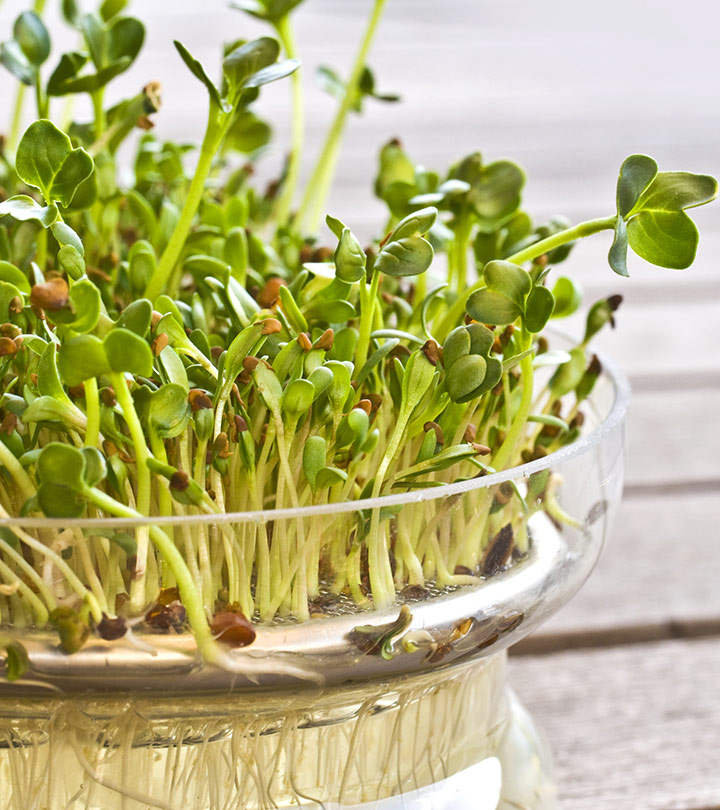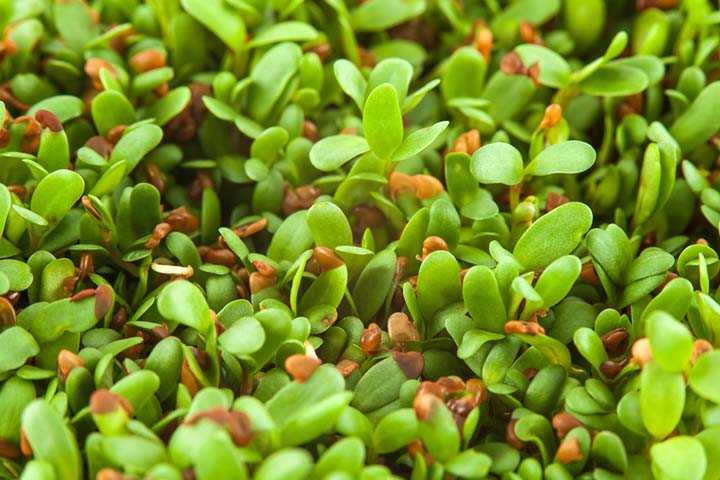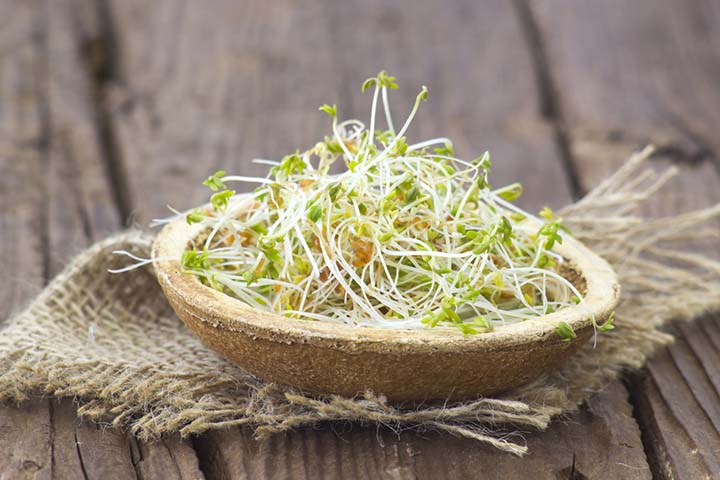Alfalfa (Medicago sativa), also known as lucerne, is a plant of the Fabaceae family (1). Its leaves and roots are used to prepare herbal supplements in traditional medicine, whereas its seeds are used as food. Several mothers use alfalfa postpartum during breastfeeding as the plant possesses galactagogue effects (2). But is alfalfa safe for nursing mothers and their babies?
Can consuming alfalfa help boost nutrition and increase breast milk supply by adding vital vitamins and minerals? Read on as we give you an insight into the safety of alfalfa for lactating women, its possible health benefits, and its side effects. Understanding these details is necessary before you add alfalfa to your lactation diet.
Is Alfalfa Safe When Breastfeeding?
Alfalfa is “generally recognized as safe” (GRAS) by the US Food and Drug Administration (3). However, there is inadequate data on the safety and efficacy of this plant-based ingredient for nursing mothers. For this reason, alfalfa consumption in lactation should be done only under expert guidance.
Possible Health Benefits Of Alfalfa During Lactation
In some cultures, breastfeeding mothers use alfalfa to increase their breast milk supply. The following are some of the possible benefits of consuming alfalfa for breastfeeding women.
- Galactagogue: Anecdotal evidence suggests alfalfa herb is a galactagogue (4). Several breastfeeding supplements contain a mix of fenugreek seeds with alfalfa to enhance breast milk secretion (5). However, there is insufficient scientific data to support the use of dietary supplements containing alfalfa for lactation support (3).
- Cardiovascular health: Regular consumption of alfalfa seeds might reduce triglycerideiXThe most common type of fat found in the human body obtained from food.and LDL (bad cholesterol) levels (6). Saponins in the seeds help reduce intestinal absorption and support the removal of cholesterol (2) (7). However, these cardiovascular benefits need further research.
- Blood sugar management: Alfalfa leaves are traditionally used to manage low blood sugar levels by stimulating insulin secretion (6). Moreover, antioxidantsiXSubstances that prevent cell damage caused by free radicals.found in alfalfa may help reduce complications, such as kidney problems,caused by high blood sugar levels (7).
- Digestive health: The use of young alfalfa leaves to treat digestive concerns has been well-documented in traditional Chinese and Ayurvedic medicine (3). Animal studies show that the dietary fiber and saponins present in alfalfa leaf could be responsible for its beneficial effects on digestive health.
Discuss the alleged nutritional benefits of alfalfa with your doctor before consumption.
Probable Side Effects Of Alfalfa When Breastfeeding
Consider these possible side effects before consuming alfalfa when breastfeeding.
- Gastrointestinal issues: Consuming the herb in large quantities may cause an upset stomach, digestive problems, and diarrhea in infants.
- Breast milk oversupply: Excess alfalfa consumption may cause an oversupply of breast milk. If you notice breast engorgement, then stop consuming the herb and see a doctor. If breast milk production drops below normal, then you can gradually add alfalfa to your diet under medical guidance.
- Possible drug interaction: Alfalfa consumption can also interfere with blood thinner medicines due to the herb’s vitamin K content.
- Infection: Consume cooked alfalfa sprouts during lactation. Raw or undercooked alfalfa might lead to complications arising from salmonella infection (8).
- Photosensitivity: Large doses of alfalfa might also increase your sensitivity to sunlight. If you are already sensitive and taking medicine for the same, then alfalfa can aggravate the possibility of sunburn or rashes.
- Autoimmune disorders: Alfalfa can cause immune system stimulation, which increases the risk of developing autoimmune diseases, such as lupusiXA condition in which the immune system attacks its tissues, causing inflammation. and multiple sclerosisiXA disorder of the central nervous system that causes problems of speech, coordination, and vision, numbness, and walking difficulties. (9). If you have an autoimmune disorder, then avoid alfalfa unless recommended by a doctor.
- Hormonal disorders:Estrogenic isoflavonoidsiXA type of polyphenol contained in legumes, with structural similarity to estrogen hormones and can increase the blood estrogen levels. present in alfalfa might have the same effects as the estrogen, a female hormone. Therefore, the use of the herb should be avoided if you have hormonal disorders or conditions, such as cancer.
If your doctor gives you the go-ahead to consume alfalfa, then you can consider exploring all the ways in which you can add the herb in your diet.
Ways To Consume Alfalfa When Breastfeeding
Alfalfa leaves and sprouts contain saponins, phytoestrogensiXBioactive compounds found in plants that may either inhibit or carry out the functions of estrogen., estrogenic isoflavonoids like daidzein and genistein, vitamin K, and the essential amino acids (4) (7). The following are some ways to eat alfalfa while breastfeeding.
- You can make concoctions or alfalfa tea from its dried leaves.
- Use cooked alfalfa sprouts in salads or fresh leaves for soups, salads, and other food preparations.
- Add small amounts of alfalfa sprouts to gravies prepared from green leafy vegetables.
- You may also try alfalfa supplements under medical guidance.
For a herbal remedy, you can try consuming alfalfa tablets or even as part of herbal tea.
Precautions To Take While Consuming Alfalfa
Follow these precautions to be on the safe side (10):
- Buy alfalfa products such as dried leaves, seeds, sprouts, and supplements from a reputable store to be sure of its quality.
- Consume alfalfa as per the recommended dosage only. To know the right dosage, you may consult a nutritionist or a certified lactation consultant.
- Follow the duration of consumption as per professional instructions. Long-term consumption may not be safe.
- If you take hypoglycemiciXA condition of low blood sugar levels.drugs when breastfeeding, then do not have any alfalfa product without first consulting the doctor.
- Avoid consuming alfalfa if you are on immunosuppressants or birth control pills.
Alfalfa during breastfeeding should be consumed only under expert guidance due to inadequate evidence of its safety and efficacy in nursing moms. It is a galactagogue, helping to increase breastmilk production. Alfalfa is also known to promote digestive and cardiovascular health and control blood sugar levels. However, overuse can result in side effects such as overmilk supply, photosensitivity, gastrointestinal troubles, and drug interactions. You may use dried alfalfa to make tea concoctions or cook alfalfas in salads, soups, and other recipes. Avoid consuming raw or undercooked alfalfa since it may contain salmonella.
Key Pointers
- The US Food and Drug Administration recognizes Alfalfa as generally safe (GRAS), but limited data exists on its use by breastfeeding mothers.
- Breastfeeding mothers sometimes consume Alfalfa to increase breast milk supply, but its efficacy lacks sufficient scientific evidence.
- Health benefits include lowering triglyceride and LDL levels, managing low blood sugar levels, and improving digestive health.
- Possible side effects include gastrointestinal issues, breast milk oversupply, potential drug interaction, infection, photosensitivity, and autoimmune disorders.
- Purchase high-quality products, seek medical advice before use, and avoid raw or undercooked sprouts.













